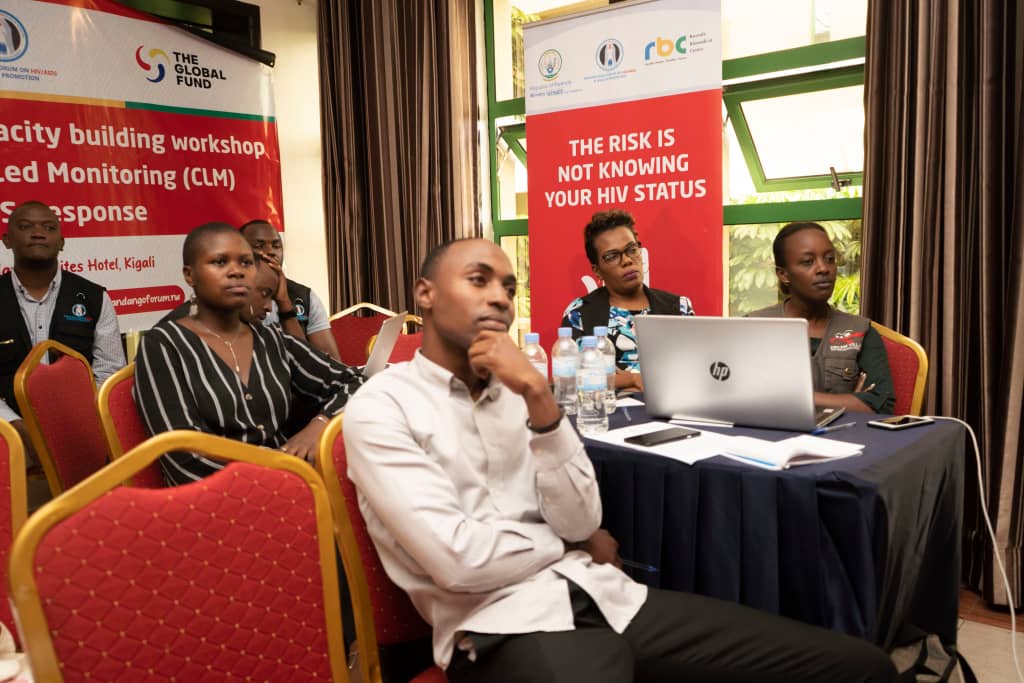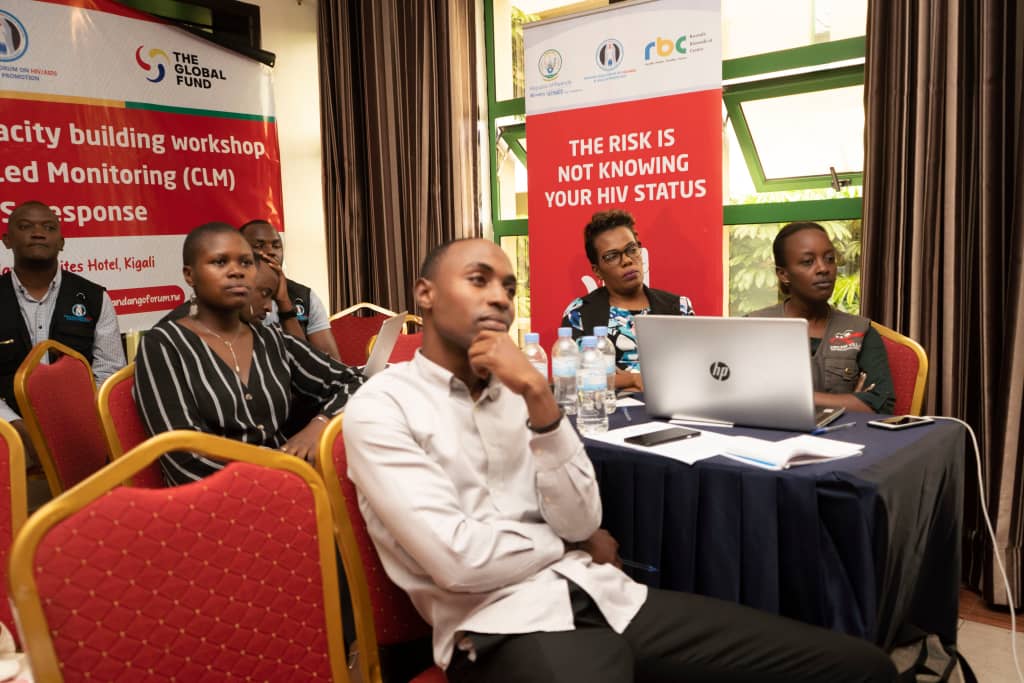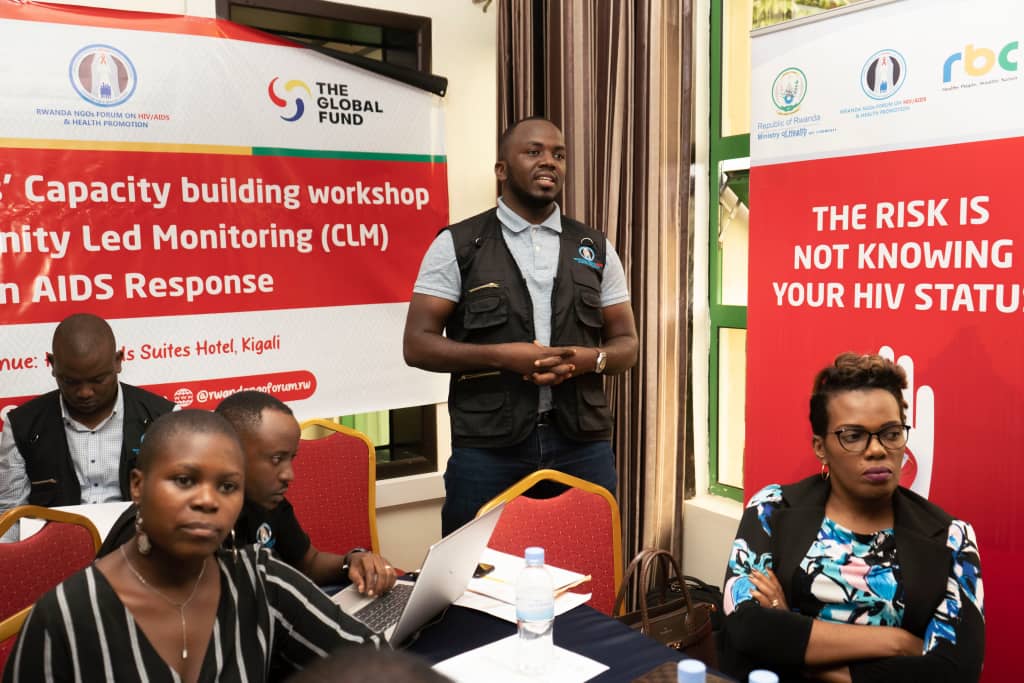By Elie Mutangana.
Rwanda NGOs Forum on HIV/AIDS & Health Promotion, a network of 139 NGO members has trained 26 members working with Key and Vulnerable Populations(KVP) on effective implementation of Community-Led Monitoring (CLM) initiatives in the HIV response to monitor , evaluate and advocate for the improvement of HIV-related services, policies, and programs.
The two-days workshop highlighted the need for community monitors to uncover problems facing key populations, escalate evidence-based advocacy and campaign for intervention of duty bearers, ultimately contributing to better health outcomes.
Specifically, the workshop stressed the urgent implementation of the new monitoring system to fast-tract scourges affecting key populations infected and affected by HIV/AIDS such as female sex workers, men who have sex with men, people who use drugs, Transgender, AGYW, People with disability, Prisoners, Refugees, Fishermen and others.

Louis Ngabonzima, Program Manager at Rwanda NGO Forum reaffirms the vitality of CLM in enabling the communities drive tangible imperatives.
“The workshop aimed at capacitating specific members under our umbrella for enabling them implement CLM initiative for conducting reliable information from key populations. Whenever we have an initiative, we train them comprehensively so that to facilitate the proper implementation of the initiatives, and ensure that it benefits the end-users.” He said in an interview with journalists.
According to him, it is anticipated that the implementation of the new monitoring system will help with reaching out to all key populations, and make sure that no one is left behind.
Ange Mickel Karamage, Health System Strengthening Officer at Health Development Initiative (HDI) who represented the member organization in the workshop acknowledges the expected contribution of the CLM, labeling it as a ‘crucial tool’ to detect challenges impending beneficiaries as well as assuring quality of service.
“We realized that it is important for members of communities to involve in self-made monitoring and get accurate information by ourselves from our respective communities. For example, in the supply chain, we have been relying on information especially from Health Information Management System (HIMS) while CLM can help us monitors and obtain specific reliable information from our beneficiaries”.

Ange Mickel Karamage, Health Systems Strengthening Officer at HDI labels CLM as a critical tool to detect challenges affecting KVPs
Sylivia Ingabire, who represented Dream Village Organization added that the system will allow the community monitors advocate critical gaps in KVPs for urgent intervention of duty bearers and give insights to policy makers.
Furthermore, while effectively implemented, it is expected that the equipped members will advocate for policies, programs and resource allocation decisions that respond to the needs and priorities of Key Populations.
Why now for Community-led monitoring on HIV.
UNAIDS defines HIV community-led monitoring as an accountability mechanism for HIV responses at different levels, led and implemented by local community-led organizations of people living with HIV, networks of key populations, other affected groups or other community entities.
In general, it is cyclical process in which people affected by inequities, particularly in HIV systematically monitor service, analyze the data they collect and conduct evidence-driven advocacy to improve service delivery, generate solutions and create an enabling environment for their well-being.
CLM includes data collection, analysis and translation, engagement and dissemination, advocacy and monitoring. It is characterized by; empowering communities, amplifying voices, strengthening accountability, improving care and saving lives.
Though the system is globally new and not yet adopted by many communities, the government of Rwanda is committed to addressing HIV/AIDS and promoting evidence-based researches to contain the prevalence of the infections.
According to Rwanda Population-based HIV-AIDS Impact Assessment (RPHIA), HIV prevalence in Rwanda is still concentrated in the specific and key populations including adult people.
Currently, there is HIV prevalence rate of 2.6 percent among adult population aged 15-45, both women and men having 2 3,2% and 2,0% respectively.
The prevalence is attributed to the impact of reduced mortality and high retention to treatment.
Not only in adult population, even in young population, women are still recording vulnerability to infection being three times more infected than men.
Critically, there is a notable substantial HIV prevalence in populations such as female Sex workers (FSW) and men who have sex with men (MSM).

26 members working with Key and Vulnerable Populations(KVP) were trained on effective implementation of CLM





